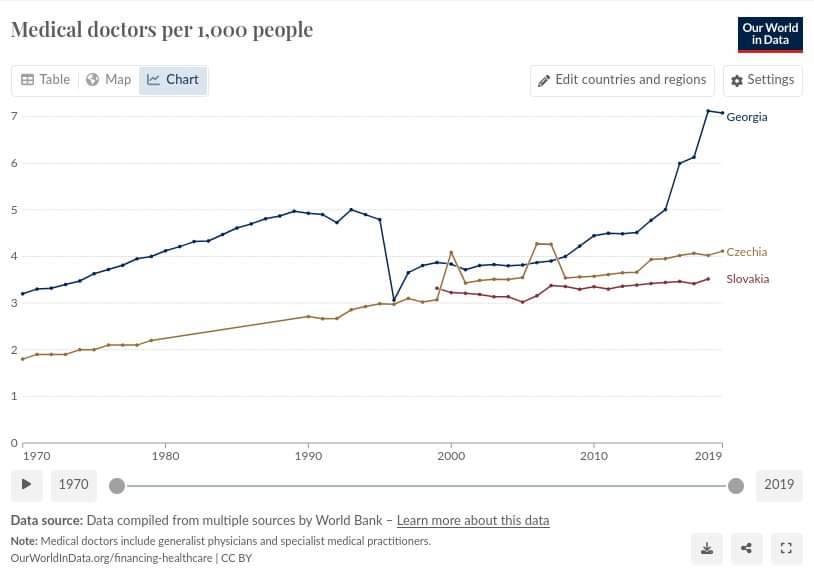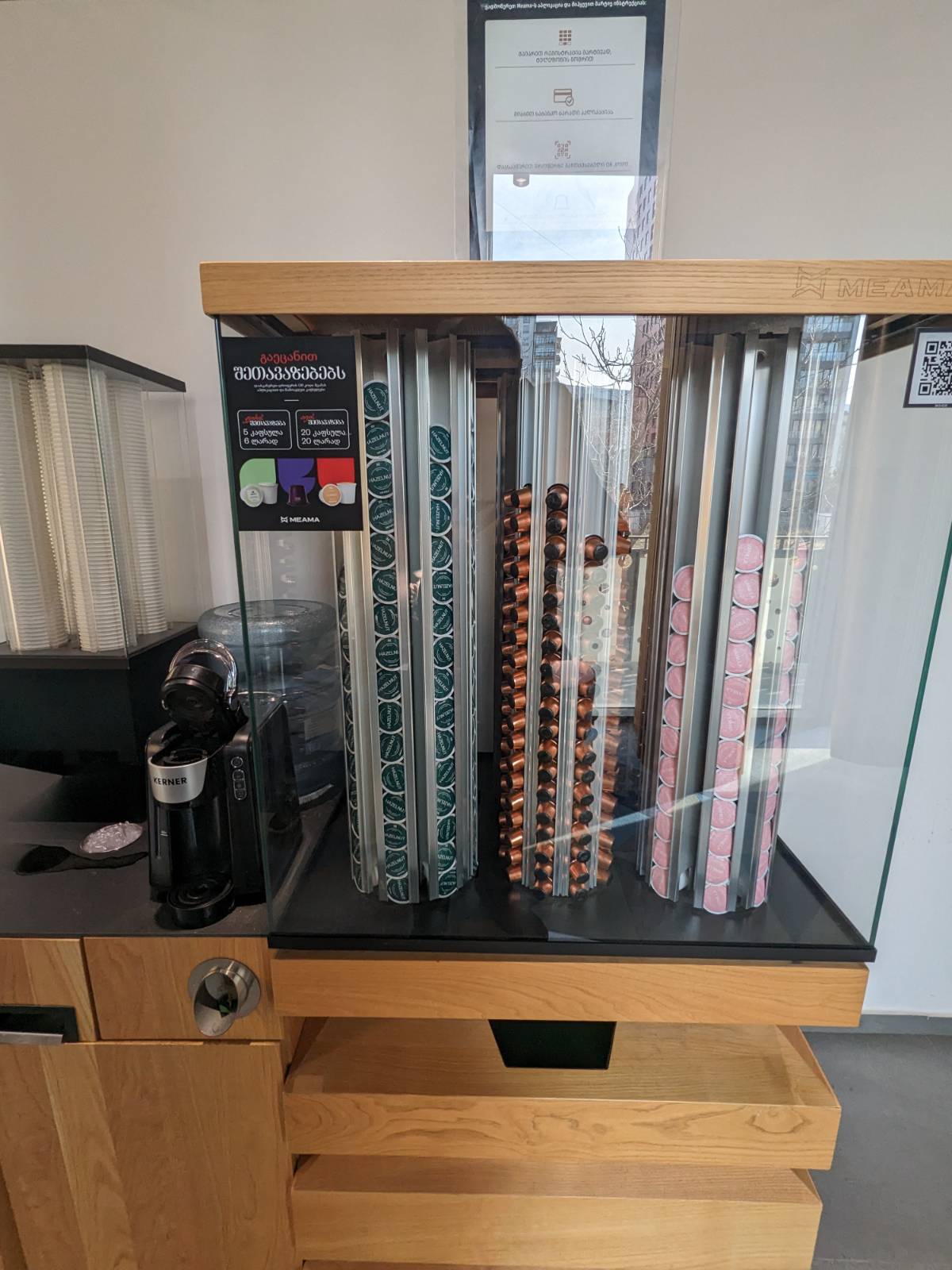EU healthcare – a little music for a lot of money
I remember the year I paid €7000 in health levies in Slovakia. I did not go to the doctor even once. I remember my Swiss friends telling me they did not even pay that much for the best healthcare system in the world. Now, many years later, when I am older and potentially a higher-risk patient, I pay €1869 for a full year of top-of-the-range global health insurance with William Russell (€155/month) with perfect cover for both cancer and cardiovascular disease. I don’t use Slovak healthcare. I go to the best private hospital in Bangkok or Vienna, where my global health insurer reimburses all “inpatient” costs. Since I am a big fan of medical tourism, my current William Russell program only covers my “inpatient” costs related to hospitalization. I go to Thailand for “outpatient” check-ups and just started going to Georgia.
A few days ago, I met a friend in Slovakia who complained to me that he pays unrealistic health levies and doesn’t give a damn because he can’t find a neurologist anywhere in his region. He’d love to pay for one, but he’s not there (or there are no free appointments). I explained that he could solve this problem quickly – by moving to a country where medical tourism works, where he can visit a neurologist immediately. My friend was not happy with this answer. After all, he pays a hefty 15% health levy on his income (in Slovakia, it includes any income, including the sale of crypto). It sounds like an awful joke to read the Slovak Constitution, where Article 40 guarantees “free” health care for citizens – in a situation where you pay up to €9128 per year for health levies in Slovakia. For a friend who needs it and pays a lot in health levies, healthcare in Slovakia simply doesn’t work.
Many people are upset that health insurance companies are making outrageous profits. The real problem is not the profits but the fact that all residents of the EU have to be involuntary clients of their healthcare insurance companies under threat of the law and contribute to these profits involuntarily!
I have no problem with any company making a profit as long as I can voluntarily decide whether or not to be a client. As an EU resident, it is impossible not to have compulsory health insurance in an EU country (and only pay for global health insurance).
I have visited more than 100 countries worldwide. As in Slovakia, I do not know of any other country where 15% health levies on personal income would be necessary. Given the current catastrophic state of the Slovak healthcare system, I find this inadequate. I have much better global health care than my friends in Slovakia, especially when I pay several times less for private international health insurance than when I had to pay compulsory health levies in Slovakia. Unfortunately, Slovaks in Slovakia are victims of the health insurance companies’ lobby oligopoly, from which they cannot leave without canceling their permanent residence.
What about your EU country?
Is there anything that can be done about it?
Time for health tourism
Traveling for health, specifically for a functional capitalist healthcare system with high accessibility and quality services, is nothing new. In Thailand, Malaysia, and Mexico, it has been operating mainly for American citizens for some time. With the current cost of American health care, often the cheapest solution is to buy a round-trip ticket to Bangkok, sort out any health problems or get your teeth fixed there, enjoy the Thai beaches, and return home to the US. It will probably work out cheaper than going to the hospital in your American hometown for surgery.
I tried medical tourism in Thailand for myself – I visited several of the best hospitals there: https://www.vejthani.com/, https://www.bumrungrad.com/, https://www.samitivejhospitals.com/ (the first two are also among the best Thai hospitals for cancer treatment). Comparing these hospitals is hard because I’ve had only the most positive experiences. And they have reasonable prices. I was there for one surgical procedure and the following year for a complete preventive check-up. The biggest shock I had was when I learned that there was no need to book any appointments in advance (including surgery!) I just arrived at the hospital and went straight to the surgery after the initial check-up.
Similarly, I didn’t need to make an appointment for a complete preventative check-up—I just turned up. All the doctors were fluent in English and explained everything to me. Thai nurses accompanied me everywhere. They made me breakfast, coconut flat white, and a shower. It was a very positive experience. If every visit to the hospital were like that, people would love to go there.
Bangkok is not the only place for medical tourism. There are also great hospitals in Kuala Lumpur or Istanbul (I recommend trying the “Beauty Health Travel” services of the company Aladiva, which will provide you with medical treatments and services in Istanbul ranging from those that are not reimbursed by the EU insurance company (new teeth, hair transplantation, plastic and aesthetic medicine, eye surgery…) to classical medical procedures without complicated processes and long waiting times, as well as preventive check-ups). If you use the LIBERATIONTRAVEL discount coupon, you can even get 8% discount on all the above services (just write/tell them when ordering). Although Turkey has problems with hyperinflation, it has a very potent economy and excellent health services at low prices (also due to hyperinflation itself).
I haven’t used medical tourism services in Turkey yet, but I will do so in the future.
Healthcare for the rich works even better in Ukraine. In Kyiv, at three o’clock at night, if you have any problem, you can call a private doctor with complete equipment who will do all the tests and find out what your problem is. You pay him a few hundred dollars (a lot of money for Ukraine), but you have everything immediately. I can’t imagine a similar service in many EU countries. After all, in the EU, healthcare for the patient is not primarily a question of money (and I wish it were).
Two weeks ago, I decided to take advantage of medical tourism in Georgia. Before you start swearing at this post-socialist country, please read the next chapter.
When the direction is more important than the current state
If you want to do any planning for the future (such as investment), more important than knowing the current state of the country is knowing where the country is going. In this respect, you need to compare developed EU countries and underdeveloped countries like Paraguay or Georgia. Thanks to high taxes and regulation, EU countries are on a path of slow economic growth and stagnation. In contrast, countries like Paraguay or Georgia are growing steadily thanks to low taxes and pro-market regulations. For comparison, according to statistics from December 2023, Paraguay’s GDP growth was 9.12%, and most EU countries were less than 1%.
It can be difficult to notice this difference, especially in a situation where Europe, especially Western Europe, has historically accumulated a lot of capital that can be spent for many years on various socialist experiments to show that “European socialism” works after all. Poor countries like Paraguay or Georgia do not have this capital, so despite well-set economic reforms, you will notice that their infrastructure is underfunded and underdeveloped. But that doesn’t mean they are not moving in a good direction. It’s hard to explain to my Paraguayan friends, to whom I tell them that low taxes and minimal regulations are correct and that they must “wait.” They still see only poverty behind low taxes in Paraguay (I explain to them that if they paid European high taxes, they would only be eating “roots” in Paraguay at the moment:)
As I travel a lot and can compare life in different countries, I see the economic stagnation of the EU. Conversely, I see the growth of countries like Paraguay or Georgia, which, as “underdeveloped” countries, already have excellent services that don’t work or are very limited in the EU (and mostly only getting worse).
One of these things is Georgian banking.
The other is Georgian Healthcare.
Georgian healthcare
Deregulation as a route to higher quality and lower prices
Until 2003, Georgia had a similar model of health insurance as most EU countries – the employer had to contribute 3% of the employee’s income for health insurance, and the employee had to contribute another 1% (for comparison – in Slovakia, it is 15%, so almost four times more!).
After 2003 (the Rose Revolution), compulsory health and social insurance was abolished and delegated completely to the private sphere.
It should be noted that despite this, a universal health coverage program exists (and is tax-funded) in Georgia. The state fully covers medical costs for retirees, children under 5, and mentally and physically disabled people. Similarly, expenses related exclusively to emergency treatment and visits to general practitioners are fully covered. Other people’s costs for all other medical expenses are covered, but only up to 30%.
If you want better or full coverage for your health costs, you need to buy private health insurance.
The absence of compulsory health insurance means that private health insurers have to COMPETE for their clients, which translates into higher quality and lower prices. As the client may choose not to use their services at all.
This is a critical argument, in my opinion, because European health insurance companies have legally guaranteed clients under the threat of violence (everyone who is a permanent resident in the EU has to pay compulsory health insurance, even in a situation where, like me, he pays for example significantly better global health insurance, which will cover all his medical costs in the EU).
EU citizens are de facto vassals of an oligopoly of a few health insurance companies, from which they cannot leave without cancelling their temporary or permanent residence.
Let me try to explain it better – if our IT security firm had legally guaranteed clients, which means that they would be required by law to order and pay for penetration tests and security audits every month, then our firm, along with our other competition from the state-appointed oligopoly, would indeed have made a cartel, raised our prices, and lowered our costs (and the quality) of our services. Why stress unnecessarily when our Slovak clients cannot leave the Slovak market and must, by law, only pay for our services? The only thing we would invest in is propaganda that if they are not legally our clients, they will indeed be hacked! Unfortunately, a similar “meme” exists in the EU and is typical – “if you don’t pay your compulsory health insurance, you will die untreated on the street.” This is, of course, complete nonsense – I don’t pay any compulsory health insurance, and I have better and cheaper health care even in the EU than the Europeans who live there.
A very high number of doctors per capita
Georgia has a very high number of doctors per capita compared to other European countries. In 2015, it was 573.3 doctors per 100,000 inhabitants (one doctor per 174 people). In 2019, it was seven doctors per 1,000 people (one doctor per 142 people). In comparison, in Slovakia/Czech Republic it is twice less. One of the reasons is that the top medical universities in Tbilisi are rated as the best in the local region.

Cheap medicines
All medicines are 2-3 times cheaper in Georgia than in the EU, thanks to free trade agreements with Turkey and China. If you want to react to this – “I guess I won’t be putting Chinese sh*t in me,” then let me assure you that you can already buy Chinese medicines in European pharmacies – just with high import duty, as the state wants to make money from them.
If your diagnosis requires regular use of expensive medications (and if your EU insurance company doesn’t want to reimburse you for them), medical tourism in Georgia or Turkey is what you need.
High availability
Thanks to minimally regulated capitalism and an above-standard number of doctors, the availability of health services in Georgia is indeed high. For example, there are 24×7 dental clinics (beware, this is not an emergency room!). You usually make an appointment, for example, for a dental implant or dental hygiene, on Sunday at 3:30 in the morning, and usually, the dentist will take you at that time.
Question for the reader: Can you find any medical facility in the EU that is open 24/7 with only 5-star ratings out of 232 total reviews?
In Tbilisi, it’s the Smile dental clinic. Here, you can find the reviews themselves.
Private health insurers
The following are the most noteworthy:
As a foreigner, you can get insurance entirely online from these health insurance companies in a few minutes.
Bitcoin is everywhere, even in Georgian healthcare.
Georgia is a very crypto-friendly country. If you are a tax resident of Georgia, you enjoy an excellent 0% crypto tax (in Slovakia, the total crypto tax burden is 40%). There is probably the world’s largest concentration of Bitcoin machines (you can find them literally on every corner). You can use Georgia’s largest crypto exchange, cryptal.com, and send your exchanged cryptos straight to your SOLO bank account within minutes.
And yes, there are machines in Georgian hospitals where you can pay with Bitcoin Lightning (and other altcoins) for coffee. I tried it out early and bought a vanilla espresso.

Personal experience
As a supplement to my global health insurance (William Russell), I paid for private health insurance with the Georgia health insurance company ARDI (as a premium SOLO account holder with Bank of Georgia, I got special rates from them). I pay for the Vitamin B insurance program.

Here, I would like to point out one crucial thing—in Georgia, even foreigners, i.e., non-Georgians, can pay for private health insurance, which can reimburse you for all medical expenses in Georgia! You don’t need anything special for this.
For example, it is impossible in the EU without temporary/permanent residence. This is, of course, related to the fact that what you pay in the EU is not health insurance (as in Georgia) but health tax. And it doesn’t depend on your age or health status but on your income.
I pay 99 GEL (34 EUR) per month, I get a preventive check-up once a year, 100% coverage of “inpatient” services (in case of hospitalization), 60% coverage of all “outpatient” services (all health check-ups) and 70% coverage of all dental services at the best private hospitals in Georgia, which I am entirely free to choose, plus 70% coverage of all medications. Plus, I get five personal visits to my family doctor a year included in this price, who can also come to see you at your hotel.
If I paid just a little more—42 EUR per month—I would have 80% coverage for all “outpatient” services and medications, 90% for all dental services, and unlimited family doctor visits to my home.
Show your ARDI mobile app to the dentist at 3:30 on Sunday, and he will give you a 70% discount (if you pay for ARDI Vitamin B insurance for 36 EUR per month) or a 90% discount (if you pay for Vitamin C insurance for 44 EUR per month). In the end, you only pay some 10-30%, and since private dentists here are 2-3 times cheaper than in the EU, you pay an utterly ridiculous price.
And the best thing, which is unimaginable in the EU healthcare – in this price I also have a VIP healthcare personal assistant.
The whole Georgian healthcare system is controlled via WhatsApp – I write to my VIP medical assistant what my problem is, she calls the specialists in the best hospitals (I can choose whether I want the highest availability or the best doctors), arranges exact dates, calls the pharmacy, arranges to pick up the medicines and sends you the actual schedule of scheduled visits (this service costs me 2.4 EUR per month!). I don’t understand how I could live without this incredible service until now. Of course, you don’t have to use the services of a VIP medical assistant. You can choose the best hospital and doctor in Georgia by yourself and just get reimbursed by your health insurance company (I have the “Free Choice” service that allows me to do this).
One of the best things about the Georgian health system is that the price of health insurance is fixed for everyone under 70 (!) If you are over 50 and the price of global health insurance is too high for you (since, in this case, the price closely reflects your age), you can still get a perfect price with a Georgian private health insurance company and enjoy the benefits of Georgian health care.
What was my quick entry into Georgian healthcare like?
-
On Thursday, I contacted my private SOLO banker on WhatsApp to try their premium health insurance from ARDI. She connected me with an ARDI salesperson. I wrote to ARDI about which insurance plan I wanted, when, and how often I wanted to pay for it (once in a quarter, once in half a year, or once in a year). My SOLO banker set me up with regular payments. I signed a contract online with ARDI that same day.
-
On Friday, my family doctor called me and asked me what tests I wanted in a preventive check-up; I explained my family history, and he wrote me a list of recommended check-ups. I forwarded this to my VIP healthcare assistant on WhatsApp and explained that I wanted to schedule the necessary preventive checkups accordingly. She sent me a complete “schedule” of confirmed specialist visits within minutes. I would point out here that you must remind her that you prefer English-speaking doctors. Otherwise, she may assign you ones who only speak Georgian and Russian (which is not usually a problem because there is always someone who speaks English).
-
On Saturday (when Georgian hospitals are open), they performed all my blood and urine tests. In one and a half hours (!), they emailed me all the results.
-
On Monday, I saw a urologist and a radiologist (you usually have an appointment with a specialist the next business day, a couple of days at most). They performed the necessary examinations. I then saw a doctor who interpreted the results of these tests, including blood and urine results. I didn’t catch up anymore, as I was flying out of Georgia on Tuesday morning.
I can continue with more tests when I return to Georgia next month. I should point out that I paid absolutely nothing – everything was covered by my Georgian health insurance (for 36 EUR/month).

I want it now. How to start?
-
As a foreigner, you can contact any private health insurance company in Georgia that can cover you remotely. Suppose you want special rates for the best coverage offered by ARDI insurance for Bank of Georgia private SOLO clients. In that case, you can write to us, and we will open a premium SOLO bank account with the Bank of Georgia entirely remotely for you.
-
You then write to your private banker on WhatsApp that you, as a SOLO customer, are interested in ARDI insurance. He will connect you to the appropriate agent, and you will take out the actual health insurance online (I pay for Vitamin B for 36 EUR/month, including VIP health assistant, but you can also pay for a cheaper or more expensive program).
-
You write on WhatsApp to your VIP medical assistant when exactly you will be in Georgia and what your health problem is, and he will arrange the best specialists for you. You’ll either have the tests completely free, or your ARDI insurance will pay 60-90% of them according to your insurance plan (in the end, you’ll pay a ridiculous amount).
For comparison – in Slovakia, the minimum health insurance is 97.80 EUR. In Georgia, for 129 GEL (44 EUR per month), you have the highest possible coverage (90-100%) and practically free the whole Georgian healthcare (we are talking about the best private hospitals) and 90% coverage with private dentists (!) Including a VIP medical assistant who will arrange and plan everything for you via WhatsApp.
Planning a trip to Georgia
One of Georgia’s most significant advantages is that you can get there cheaply and quickly (for example, just for a 50 EUR direct flight from Vienna to Kutaisi via Wizzair).
Kutaisi is not Tbilisi but a small city (with a population of 150,000 people). Still, some hospitals are worth checking out and might be fine for you (your insurance will cover it, so why not?). I recommend trying at least LJ Clinic (or possibly Kutaisi Church Hospital or Military Hospital).
Or you can continue to Tbilisi from Kutaisi Airport. The most comfortable connection is a comfortable train, which will take you there in three hours. Directly from the airport, you can take a free “shuttle” that will take you to the train station in a few minutes, from which you will have a direct connection to Tbilisi. You can find the connection and buy train tickets here. You can buy a first luxury class ticket for 24 EUR.
The other alternative is to take a bus directly from Kutaisi airport to Tbilisi, for example, via Georgian Bus. You can buy a ticket online, and it costs about 7 EUR.
There are many quality hospitals in Tbilisi. I recommend Kani Clinic, Gagua Clinic, American Medical Centers Tbilisi, and Raymann Clinic. Of course, there are specialized clinics for cardiovascular diseases in Tbilisi, such as the Tbilisi Heart and Vascular Clinic and the best maternity clinic, the Chachava Clinic. If you try them, let me know by commenting below on your experience.
I don’t want to pay for compulsory health insurance in the EU!
You can only avoid paying for health insurance in the EU if you cancel your permanent residence there. If you continue to live in the EU as a tax resident, you cannot have any income there as an individual. Otherwise, you are still liable to pay the levy. This is technically and legally possible if you only live on savings or a loan. For more information, see the presentation on How to leave the system while staying in one place.
Conclusion
Health tourism is not just a service for digital nomads but for everyone dissatisfied with their healthcare and has to wait months for an appointment.
Thousands of people die every year from serious illnesses that the healthcare system failed to diagnose because they didn’t get a date.
Remember that somewhere in the world, there are specialist doctors and hospitals where they can diagnose and treat you RIGHT NOW!
Without waiting and for good money.
Medical tourism can save your life and the lives of your loved ones.
